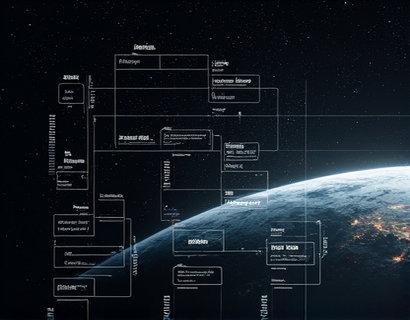Optimizing Virtual Entity Care: Cutting-Edge AI Software Solutions for Enhanced Digital Management and Live Caretaking
The rapid evolution of digital environments has led to an increased reliance on virtual entities, ranging from sophisticated NPCs in video games to AI-driven avatars in corporate simulations. As these digital creatures become more complex and integral to various applications, the need for advanced care and management solutions has become paramount. This article delves into the cutting-edge AI software solutions designed to optimize the performance and well-being of virtual entities, providing developers and caretakers with essential tools to ensure seamless digital management and live caretaking.
The integration of AI in virtual entity care is revolutionizing the way we interact with and manage digital beings. Traditional methods of managing virtual entities often fall short in addressing the dynamic and multifaceted needs of these entities. AI-driven solutions, however, offer a more adaptive and responsive approach, capable of learning from interactions and adjusting to the unique behaviors and requirements of each virtual creature. This not only enhances the user experience but also prolongs the lifespan and efficiency of digital entities.
One of the key challenges in virtual entity care is ensuring optimal performance without compromising on the entity's "well-being." This dual focus is crucial for maintaining user engagement and satisfaction. AI software solutions address this by continuously monitoring and analyzing various parameters such as entity behavior, environmental factors, and user interactions. Advanced algorithms can detect anomalies and predict potential issues before they escalate, allowing for proactive maintenance and adjustments.
For developers and caretakers, the implementation of AI in virtual entity management translates to several significant benefits. First, AI can automate routine tasks, freeing up valuable time for more complex and creative endeavors. This automation includes tasks such as health monitoring, activity scheduling, and environment optimization. By offloading these responsibilities to AI, human caretakers can focus on strategic decision-making and innovation.
Second, AI-driven solutions provide real-time insights and analytics, enabling caretakers to make informed decisions quickly. These insights can range from detailed performance metrics to predictive analytics that forecast future needs and potential challenges. Such data-driven approaches not only enhance the caretaking process but also contribute to the overall improvement of virtual entity designs and functionalities.
Moreover, AI software solutions are designed to adapt to the evolving nature of virtual entities. As new features and capabilities are added, AI systems can seamlessly integrate these updates, ensuring that the care and management strategies remain effective and relevant. This adaptability is particularly important in fast-paced industries where virtual entities are constantly being updated and enhanced.
To illustrate the practical applications of these AI solutions, consider the scenario of a virtual world populated with diverse NPCs. Each NPC has unique behaviors, preferences, and health metrics. Traditional care methods would require extensive manual monitoring and adjustments, leading to potential inconsistencies and inefficiencies. With AI-driven care, the system can automatically balance the NPCs' activities, ensure they are engaged with the environment, and maintain their health levels without human intervention. This results in a more immersive and stable virtual world for users.
Another critical aspect of AI in virtual entity care is the enhancement of emotional and social interactions. Advanced AI algorithms can simulate more nuanced and realistic emotional responses, making virtual entities more relatable and engaging. For instance, an AI-driven avatar can recognize and respond to a user's emotional state, providing appropriate support or interaction. This level of sophistication not only improves user satisfaction but also opens up new possibilities for therapeutic and educational applications.
In the realm of corporate simulations and training, AI-powered virtual entities can simulate complex scenarios and adapt to the trainee's learning pace and style. AI can analyze the trainee's performance, identify areas for improvement, and adjust the simulation accordingly. This personalized approach ensures that the training is both effective and efficient, leading to better skill retention and application in real-world scenarios.
The development of AI software for virtual entity care is an ongoing process, with continuous advancements being made to address emerging challenges. One such challenge is the creation of more autonomous and self-sustaining virtual entities. AI researchers are exploring ways to enable entities to learn from their environment and interactions, reducing the need for constant human intervention. This autonomy is crucial for creating more lifelike and interactive digital experiences.
Another area of focus is the integration of multi-agent systems, where multiple virtual entities can interact with each other and their environment in a coordinated manner. AI algorithms can manage these interactions, ensuring that each entity's actions are coherent and contribute to the overall dynamics of the virtual world. This level of coordination is essential for creating complex and believable simulations, whether for entertainment, education, or research purposes.
Furthermore, the ethical considerations of AI in virtual entity care cannot be overlooked. Ensuring that AI-driven care does not lead to unintended consequences or biases is a critical aspect of responsible AI development. Transparent algorithms, regular audits, and adherence to ethical guidelines are essential to maintain trust and integrity in the use of AI for virtual entity management.
In conclusion, the integration of cutting-edge AI software solutions in virtual entity care represents a significant leap forward in digital management and live caretaking. These solutions offer enhanced performance, real-time insights, and adaptive care strategies that benefit both developers and users. As the digital landscape continues to evolve, AI will play an increasingly vital role in shaping the future of virtual entities, ensuring they remain engaging, efficient, and ethically sound.











































